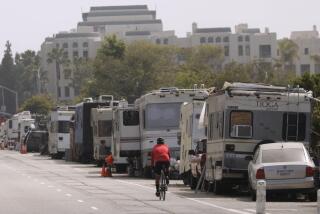Oceanside’s Migrant Housing Plan Gets Grant : Farm Workers: The city will purchase three mobile homes with money from the state grant and put them on land leased to the city by an avocado grower. The pilot project will house 21 workers.
- Share via
Oceanside received a $100,000 state grant this week for a pilot project to house 21 migrant farm workers in mobile homes on private property.
The program calls for the city to buy three mobile homes, each with seven beds and two bathrooms. Phil Gilligan, an avocado grower with a ranch in the San Luis Rey area, has agreed to lease a 2-acre plot to the city for 10 years at a total cost of $1, city officials said.
Gilligan also agreed to remodel a building already on the property as a kitchen and recreational hall for the migrant farm workers, said Richard Goodman, Oceanside’s housing director.
Goodman said that Gilligan, who had worked on city commissions addressing the issue before, was the only farmer that offered property to the project after the city had advertised for a donor in a local newspaper.
This is the first step that a North County city has taken to work with a farmer or rancher to house the people who work their fields, something many migrant support groups have advocated for years.
“It’s a drop in the bucket as far as dealing with the whole problem of migrant workers in Oceanside,” Goodman said. “But we hope it would encourage other growers to do something along the same lines as far as providing housing to their workers.”
Gilligan could not be reached for comment Thursday.
Goodman said many migrant farm workers live in cardboard shacks on the land they farm as well as in primitive encampments in the canyons, and that the pilot project will offer a model for landowners in offering decent housing to their workers.
“It’s the red tape and the hassle that’s keeping other landowners from” offering housing to their workers, Goodman said. “It doesn’t have to be nearly as fancy if an individual were to put in his own mobile home. This is definitely a showcase project that we would be doing.”
Migrants occupying the mobile homes will pay a maximum of $3.25 a day in rent, and most are likely to work on Gilligan’s ranch, Goodman said, although it is not a condition of occupancy.
Goodman estimates that $70,000 of the grant will go toward the purchase of the mobile homes, and the remaining $30,000 will be spent to supply electricity to the site. Gilligan himself will spend $30,000 on improvements, Goodman said.
The project is at least six months from becoming reality, Goodman said.
Claudia Smith of the California Rural Legal Assistance, a migrant advocacy group, conceded that the project makes only a small dent in Oceanside’s migrant farm worker problem, but said, “You’ve got to start somewhere, and this is where we started.”
Smith’s organization was a primary sponsor of the project, which was approved by the state Legislature last year with the backing of Assemblyman Robert C. Frazee (R-Carlsbad).
Conditions as to what farm workers are eligible for occupying the mobile homes are still being settled, although the Legislature has recently passed a bill that would remove nearly all restrictions as to who may stay and for how long.
More to Read
Sign up for Essential California
The most important California stories and recommendations in your inbox every morning.
You may occasionally receive promotional content from the Los Angeles Times.










